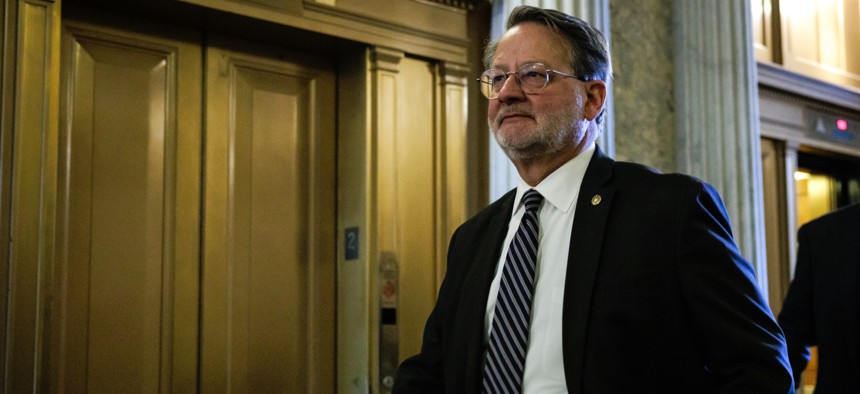
In a letter to Postmaster General Louis DeJoy, Sen. Gary Peters, D-Mich., called for a pause of U.S. Postal Service reforms until officials can show that mail service won't suffer. Samuel Corum / Getty Images
Key senator calls for pause to DeJoy’s changes at USPS
The Postal Service is not being transparent with Congress about its reform efforts, committee chairman says. USPS disputes the claim.
Updated March 20 at 7:25 p.m. ET
The top senator with direct oversight of the U.S. Postal Service is calling on its leadership to pause its overhaul of the agency’s mailing network due to potential impacts they are having on delivery, rejecting USPS assertions that is has provided transparency.
USPS should not continue its nationwide operational reforms until it can prove the changes will not negatively impact mail service, Sen. Gary Peters, D-Mich., who chairs the Senate Homeland Security and Governmental Affairs Committee, said in a letter to Postmaster General Louis DeJoy. Agency leadership said in response to the letter it has offered volumes of documents and many staff-level briefings to Congress, though Peters said USPS ignored many of his requests for additional information on its efforts and left Congress uncertain about the fallout that could befall postal customers.
“I am increasingly concerned about the pace and impacts of these changes, and reiterate my request for fully responsive answers to my questions,” Peters said. “I also call on USPS to pause all network changes until it can clearly demonstrate that such changes will not degrade local mail service. This will be a top oversight priority for this committee.”
The Postal Service is in the midst of the most significant makeover of its operational structure in decades as it continues to implement DeJoy’s 10-year Delivering for America plan that it says will make the agency more efficient and eliminate its annual deficits.
That has included consolidating mail sorting away from individual post offices in favor of centralized centers and moving processing operations away from hundreds of cities and towns in favor of 60 mega-centers throughout the country. As part of a new initiative, USPS is also rolling out an “optimized collection plan” that will require mail to sit overnight at post offices instead of being collected each evening for transportation to a processing center.
The Postal Service has seen its on-time delivery rates plummet over the last six months, though agency officials have varyingly cited contractor issues, weather and unexpected facility closures for the delays. Its performance has ticked up in recent weeks, but mail delays remain significantly higher in fiscal 2024 compared to the previous year.
Peters called the matter “urgent” and requested a response from USPS by April 1. Among the requests that have gone unanswered—Peters previously wrote to DeJoy in December and again in February—were for detailed assessments of the network changes’ impacts on service from a facility and nationwide basis, plans to study early impacts before moving forward, immediate and long-term timelines, cost estimates and employee attrition calculations.
Peters noted the changes have drawn widespread bipartisan and bicameral concerns, and several other lawmakers have complained of receiving insufficient feedback from postal management.
“The nature of USPS’s network changes has now raised significant concerns including the potential for degraded rural service due to fewer facilities, delayed delivery of election mail that would be processed at out-of-state facilities, and critical health information such as laboratory tests not being processed same-day due to decreased transportation trips,” he said.
The Postal Service has maintained the changes will allow the processing and transportation of mail to flow more logically, while reducing costs and improving the employee experience. It has acknowledged mail delivery in some regions that have piloted the agency’s changes reached an “unacceptable level of service” while apologizing for any difficulties that has caused.
Peter Pastre, the USPS vice president for government relations and public policy, said in response to the letter that Peters' assertions were "highly inaccurate" and the Postal Service has, in fact, gone to great lengths to share details of its plans. While Peters called those responses insufficient, Pastre noted the most recent response included dozens of pages with additional attachments that "provided data on service performance for specific transitioning sites." DeJoy himself has asked to brief the committee, but Pastre said Peters has not expressed an interest in accepting the offer until this week. The committee has received staff-level briefings and hundreds of notifications of changes at facilities, Pastre added, which provide significant detail on operational changes.
DeJoy is unlikely to heed Peters’ request for a pause, as he has repeatedly spoken to the urgency of his efforts and called on lawmakers, regulators and stakeholders not to interfere with them. The Postal Service is in the process of standing up hundreds of new Sorting and Delivery Centers and more of its regional mega-centers.
Pastre confirmed the Postal Service had "no plans to pause the network investments and modernization" efforts. Doing so, he said, would negatively impact employees, add costs, slow construction, harm performance, roll back new product offerings and damage the environment.
President Biden has nominated former Labor Department Secretary Marty Walsh to serve on the USPS board of governors, which must approve DeJoy’s broadstroke plans. His confirmation would give Biden his sixth nominee to sit on the board that has nine presidentially appointed, Senate-confirmed slots. Walsh would be the fourth Democrat to sit on the board, joining three Republicans and one independent.
This story has been updated with additional comment from USPS.







